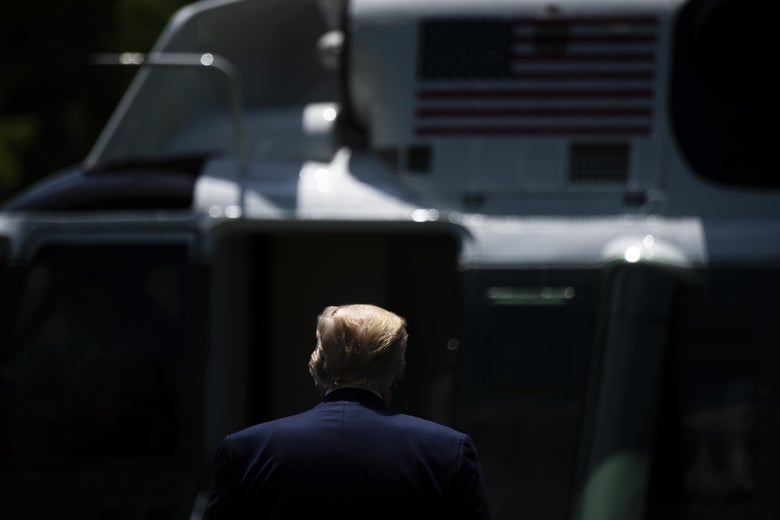
US President Donald Trump walks to Marine One after speaking to the press before departing the White House, on May 30, 2020, in Washington, DC.
ANDREW CABALLERO-REYNOLDS/Getty Images
The fear is spreading that, if President Trump loses the election this November, he’ll refuse to leave office. Bill Maher has been warning of this specter on his HBO show, Real Time, since late last year. This past weekend, New York Times columnist Roger Cohen called Trump’s compliance with the election-results “the most critical question for American democracy” and wrote that the “chances are growing” that Trump would not concede if Joe Biden won. Biden himself has raised the possibility on a few occasions.
If Trump could get away with refusing to leave the Oval Office, in order “to extend his autocratic power,” as Cohen put it, he probably would. But he wouldn’t get away with it; those around him would almost certainly advise him against it, if he asked; therefore my guess is, he won’t try. Then again, in recent years many things have happened that I would have bet against. Let’s say the nightmare happens. Here is why it won’t last long.
So it’s the morning of January 20, 2021. Trump doesn’t meet President-elect Biden and his wife in the White House driveway; nor does he attend the inauguration on Capitol Hill. Instead, he proclaims, as he has many times by this point, that the election was a fraud (he has set the stage for this with his false claims about mail-in ballots), and, at noon, instead of acceding to the transfer of power, Trump proclaims that the swearing-in was FAKE NEWS and that he remains the president.
Here is what would happen next.
On the dot of noon, the nuclear codes, which currently allow Trump to order and authenticate a nuclear attack, expire. The officer who has been following him around everywhere with the “football”—which, contrary to popular belief, is not a button or a palm print but rather a book filled with various launch codes—leaves. If Trump and whatever lackeys stay with him prevent the officer from leaving, another officer, holding a backup football, would join Biden at the inauguration ceremony.
By the same token, the entire U.S. military establishment will pivot away from ex-President Trump and salute President Biden. The principle of civilian control is hammered into American officers from the time they’re cadets—and the 20th Amendment of the Constitution states, “The terms of the President and Vice President shall end at noon on the 20th day of January”—no ifs, ands, or buts.
If Trump orders the military to do anything, they will refuse his order. If any officers obey his order—say, to circle the White House to keep him in power—they would certainly be tried and convicted on charges of mutiny and sedition, and they would know this before taking the leap.
Meanwhile, the Secret Service will abandon Trump, as they do every president whose term is up, except for a small detail assigned to protect him and his family for the rest of their lives.
Overseas, foreign leaders will cut off relations with the U.S. ambassadors in their capitals and await instructions from President Biden or his acting secretary of state.
Meanwhile, Biden’s acting attorney general will have drawn up arrest warrants for Donald J. Trump and anyone who remains at his side on charges—at minimum—of criminal trespassing. If Trump calls on the armed forces or militias or the nation’s sheriffs to come defend him, he might also be charged with incitement or insurrection.
If any of Trump’s aides or cabinet officers continue to take his orders, they too could face criminal charges and, in any case, would have a hard time finding respectable employment after the pretend monarch is taken away in handcuffs.
If armed militiamen and sheriffs rally to the White House and they refuse to let U.S. marshals through the gates, a small contingent of Secret Service or the National Guard could be called up to enforce the law. If that doesn’t work, a few M-1 tanks rolling down Pennsylvania Avenue should make the would-be rebels flee. It would be terrible if the standoff came to this, but Commander-in-Chief Biden would have this option available, if necessary.
In other words, Trump could hole himself up in the Oval Office, but the Oval Office would very soon be cut off from all power. He would have no choice but to give up. It is hard to imagine, even in this time of hard-to-imagine things happening, that a single Supreme Court Justice or more than a handful of congressional Republicans—and probably not a single member of the GOP leadership, not even Majority Leader Mitch McConnell (who, depending on how Election Day had gone, might be downgraded to minority leader on inauguration day)—would stand up for Trump’s blatantly unconstitutional ploy to stay in power.
The next 7 1/2 months of Trump’s presidency will likely be rife with tension and scandals and outrage, no matter how the election goes. There will be plenty to deal with for all of us who care about the future of the United States as a nation, a people, and a democracy.
To the extent this concerns the election, there’s more cause for worry about Trump suppressing turnout, or 2016-style tampering. The possibility that Trump won’t leave office, even if he loses, is a scenario for which Biden’s aides should draw up contingencies—but it doesn’t rank high among the things for citizens to take seriously, and take action about, now.
Readers like you make our work possible. Help us continue to provide the reporting, commentary, and criticism you won’t find anywhere else.
Join Slate Plusfrom Slate Magazine https://ift.tt/301AfGb
via IFTTT
沒有留言:
張貼留言